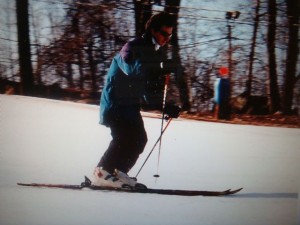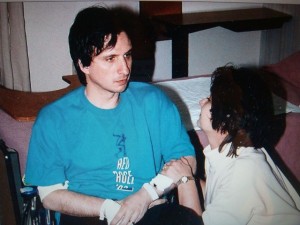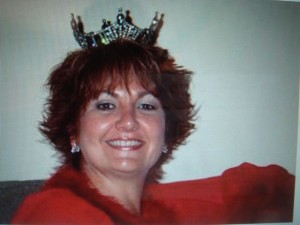
Mid Life Celebration is excited to have Guest Blogger, Lorie Sheffer return for the second in a three part series. Lorie and her husband Gary, have an amazing and challenging story to share. We can all benefit from this inspiration. Take it away Lorie:
Imagine if your dream changed from “skiing the Swiss Alps” to “being able to use the toilet without any help”, or “learning to count to 10 without making a mistake”. That is what happened to my husband after suffering his stroke.
On day one of getting his life back, Gary’s physical therapist let out a yelp of pure joy. “Feel these quads! WOW! I have something to work with!” In Gary’s case, no matter how he had taken care if himself, the bleed in his brain was inevitable. The tangle of blood vessels that made up the AVM had been there most likely since before he was born. AVMs happen in fetal development, and usually make their appearance known sometime between the twentieth and fiftieth year of life.
Because he had quit smoking over 10 years before, had skied, ridden his bike and ran, and was at a healthy weight, Gary stood a chance of recovery. The music lessons that his father refused to pay for are another protection. It seems that anything we do to strengthen our brain, learning new things, playing music, and speaking a second language all contribute to the strength and overall plasticity of our brain.
Still, Gary was in for the fight of his life, and statistically things were not in his favor.
He had trouble understanding what he was supposed to do. The therapists would show him, and then he would imitate their movements. I stayed with him till late at night, helping him with daily self-care. He had to be held on the toilet by me, or he would have fallen off onto the floor. I had to sweep my finger into his mouth and remove the chunks of food that he couldn’t feel, something known as “pouching” food. I flossed his teeth and helped him into the shower. I learned to transfer him from wheelchair to toilet to shower chair to bed. It was humiliating for him to have me do those things, but I wanted to be comfortable assisting him so as not to be panicked when we got home.
He slowly went from wheelchair to wide based cane, from wide based cane to straight cane. His speech was slow to return. When a doctor asked him to draw the numbers as they appear on the face of a clock, Gary drew a smile face. Because of his paralysis, he was unable to feel the drool, which often ran from his slack mouth. In addition to his own trauma, we witnessed the sudden death of his roommate. We made friends with an 18 year old who had been in contention for being named high school valedictorian before a traffic accident left him in a 3 month long coma, part of his brain missing from the impact. Sometimes I would stop by a friend’s room to offer support, only to be told they had passed away. It seemed that Gary was determined to do it not just for himself, but for all of them. Six weeks after being admitted to full time inpatient rehabilitation, Gary was discharged to day rehab. He was going home. His one wish, to walk out the same door he had been wheeled into.
I was told that as the brain heals, strange emotional things could happen. And they most certainly did.
Gary would burst into tears at the oddest times. He would explode into fits of rage, most often directed at me. And yet we kept going. Recovery is so excruciatingly slow that it is easy to see why some people just give up. There are no guarantees how much recovery will be made, if any. It’s not like rehab on a knee replacement or a broken hip or a torn rotator cuff. Strokes can cause disability to so many different areas that it’s hard to even know where to start. What is fascinating about a brain injury is that all the parts are in perfect working order, but you can’t get them to move. The electrical system isn’t working. Now Gary’s dream was to figure out how to make his brain work again. Everyone was anxious to see how far he could go.


